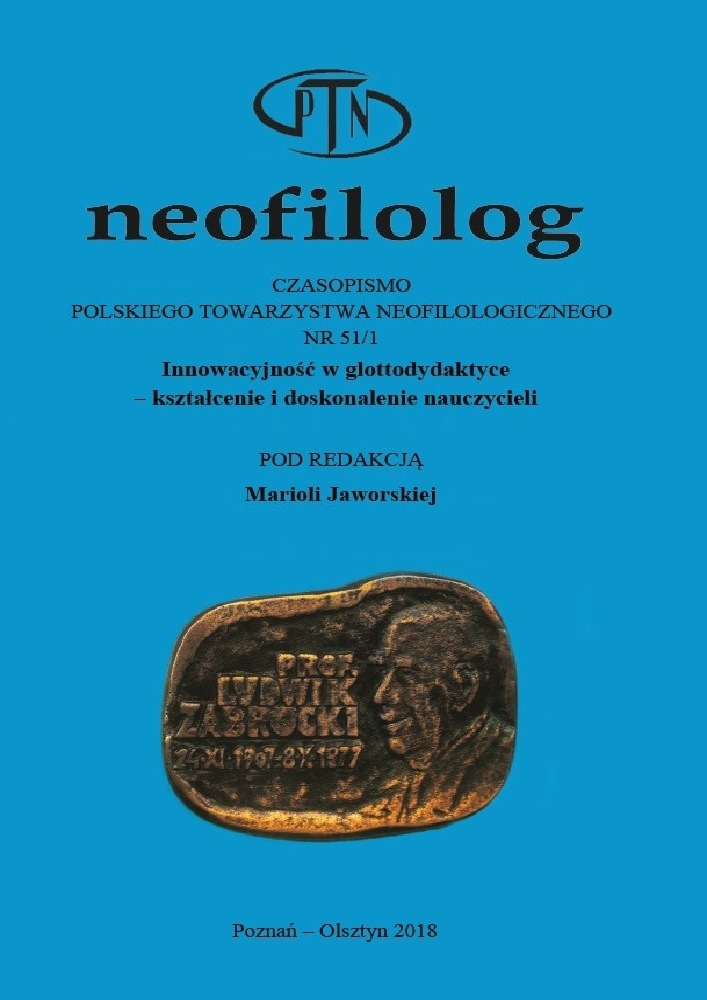Abstract
Innovation in language education, just as in any other discipline, is connected with changes whose primary goal is to make the process of language learning/language teaching more efficient. Examples of such innovations include, for instance, task based instruction, computer assisted language learning or the use of portfolio as a means of assessment.
Innovation implies a new, qualitatively different perception of the language learning/ language teaching process, roles of teachers and learners, use of materials etc., hence it is believed to constitute a challenge for language teachers and their professionalism. The present article is an attempt to answer the question whether and to what extent the language teaching profession is actually prepared to deal with innovation.
References
Carless, D. 2013. „Innovation in language teaching and learning”. (w:) The Encyclopedia of Applied Linguistics. (red. C. A. Chapelle). DOI: 10.1002/9781405198431.wbeal0540.
England, L. 1998. „Promoting effective professional development in English Language Teaching (ELT)”. English Teaching Forum, vol. 36, no 2: 18-23.
Komorowska, H. 1999. „Successful teaching: How to achieve it, how to assess it”. Network, vol. 2, no 2: 3-9.
Komorowska, H. i Kiely, R. 1998. „Quality and impact – the evaluation agenda”. (w:) Innovations and outcomes in English language teacher education. (red. P. J. Melia). The British Council, Poland: The PRINCE Project, s. 15-38.
Markee, N. 1997. Managing curricular innovation. New York: Cambridge University Press.
Markee, N. 2001. „The diffusion in innovation in language teaching”. (w:) Innovation in English language teaching. A reader. (red. D. R. Hall i A. Hewings). London: Routledge, s. 118-126.
Schleicher, A. 2016. Educating for innovation and innovation in education. http://oecdeducationtoday.blogspot.com/2016/09/educating-for-innovation-and innovation.html.
Schratz, M. 2013. What is a “European teacher”? A discussion paper. European Network on Teacher Education Policies (ENTEP). http://www.see-educoop.net.education_in/pdf/workshop/tesee/documenti/european-teacher.pdf. DW 05.05.2013.
Schulz, R. 1994. Twórczość pedagogiczna. Warszawa: Instytut Badań Edukacyjnych.
Sergeant, S. 2001. „CALL innovation in the ELT curriculum”. (w:) Innovation in English language teaching. A reader. (red. D. R. Hall i A. Hewings). London: Routledge, s. 240-249.
Smak, E. 1997. Z zagadnień innowatyki pedagogicznej. Opole: Wydawnictwo Uniwersytetu Opolskiego.
Ur, P. 1997. „The English teacher as professional”. English Teaching Professional, July, Issue 8: 3-5.
Widdowson, H. G. 2004. „A perspective on recent trends”. (w:) A history of English language teaching. (A. P. R. Howatt i H. G. Widdowson). Oxford: OUP, s. 353-372 (chapter 21).
Zawadzka, E. 2004. Nauczyciele języków obcych w dobie przemian. Kraków: Oficyna Wydawnicza „Impuls”.
License
Copyright (c) 2019 Neofilolog

This work is licensed under a Creative Commons Attribution-NoDerivatives 4.0 International License.
Authors
Authors of texts accepted for publication in Neofilolog are required to complete, sign and return to the Editorial team’s office the Agreement for granting a royalty-free license to works with a commitment to grant a CC sub-license.
Under the agreement, the authors of the texts published in Neofilolog grant Adam Mickiewicz University in Poznań a non-exclusive, royalty-free license and authorize the use of Attribution-NoDerivatives 4.0 International (CC BY-ND 4.0) Creative Commons sub-license.
The authors retain the right to the free disposal of the work.
Users
Interested Internet users are entitled to use works that have been published in Neofilolog since 2017, under the following conditions:
▪ attribution – obligation to provide, together with the distributed work, information about the authorship, title, source (link to the original work, DOI) and the license itself.
▪ no derivatives – the work must be preserved in its original form. Without the author's consent, it is not possible to distribute the modified work in the form of translations, publications, etc.
Copyrights are reserved for all texts published since 2017.
Miscellaneous
Adam Mickiewicz University in Poznań retains the property right as a whole (layout, graphic form, title, cover design, logo etc.).

